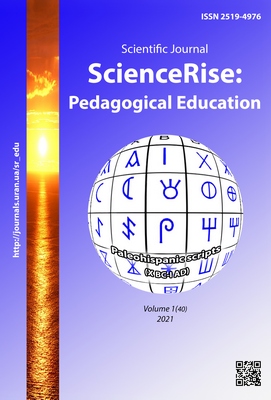Modern view of speech readiness for school of children of older preschool age with typical psychophysical development and speech disorders
DOI:
https://doi.org/10.15587/2519-4984.2021.224465Keywords:
speech readiness, speech training, general speech training, cognitive component, children of older preschool ageAbstract
A theoretical review of modern scientific sources on the problem of "speech readiness" for the schooling of older preschool children with typical psychophysical development and speech disorders is presented. The aim of research: analysis of modern research on speech readiness for the schooling of older preschool children with typical and speech disorders. The objective of research was to substantiate scientific sources on the study of the terms "speech readiness" and "speech preparation" for school in older preschoolers; determination of components of speech readiness of children of older preschool age with speech disorders.
It is established that there are different views on the definition of the terms "speech readiness" and "speech training". Speech readiness for the school includes children's mastery of grammatical, lexical norms of speech, enriched vocabulary, use in educational and everyday activities of various functions of speech; it is determined that speech readiness contributes to the process of speech preparation of the future student to master the school curriculum. Speech training involves general and special training. It was determined that the formation of basic intellectual, semiotic and regulatory components is necessary for the speech readiness of children with speech disorders, which are formed under the influence of a special complex of correctional and developmental speech therapy work. Based on the analysis of scientific sources, the components of speech readiness for the schooling of older preschool children with speech disorders were identified: cognitive is about understanding of the semantic constructions of language and speech; motivational is about understanding of social and cognitive motives of learning; the component of activity - active participation in various types of speech activity; emotional - verbalization of emotions and feelings
References
Bohush, A. M., Havrysh, N. V. (2015). Doshkilna linhvodydaktyka: Teoriia i metodyka navchannia ditei ridnoi movy v doshkilnykh navchalnykh zakladakh. Kyiv: Slovo, 704.
Kalmykova, L. O. (2016). Formuvannia u ditei starshoho doshkilnoho viku movlennievoi diialnosti: diahnostyko-rozvyvalnyi kompleks. Kyiv: Slovo, 384.
Zdanevych, L., Kruty, K. (2019). Overcoming Communicative Deadaptation of Speech Passive Children of Pre-School Age. Psycholinguistics, 26 (1). doi: http://doi.org/10.31470/2309-1797-2019-26-1-141-159
Bohush, A. M. (2017). Metodyka rozvytku movlennia i navchannia ridnoi movy ditei rannoho viku. Kyiv: Slovo, 392.
Pakhomova, N. H., Sheremet, M. K. (2009). Formuvannia movlennievoi hotovnosti ditei starshoho doshkilnoho viku z dyzartriieiu do navchannia v shkoli. Kyiv, 137.
Kalmykova, L. O., Kyuchukov, H. (Ed.) (2015). Ontogenesis of the vocal activity of children of the sixth year of life. Acquisition of Slavic Languages. Munich: Lincom, 29–53.
Pirozhenko, T. O., Soloviova, L. I. et. al. (2016). Tsinnisni oriientatsii dytyny u doroslomu sviti. Kyiv: Slovo, 248.
Shylina, N. Ye. (2003). Formuvannia movlennievoi hotovnosti ditei starshoho doshkilnoho viku do navchannia u shkoli. Odessa.
Lebedenko, D., Kuzava, I. (2018). Features of the use of techniques and methods for the development of speech of children of senior preschool age. Pedahohichnyi chasopys Volyni, 4 (11), 112–116.
Grigoreva, L. V. (2013). Pedagogicheskaia podderzhka formirovaniia rechevoi gotovnosti detei k obucheniiu v shkole. Tver, 194.
Babaeva, T. I. (2005). Problema sotsialno-nravstvennogo vospitaniia i razvitiia rebenka v issledovaniiakh kafedry doshkolnoi pedagogiki. Gotovnost k shkole kak pedagogicheskaia problema. Pedagogika detstva: Peterburgskaia nauchnaia shkola. Saint Petersburg: RGPU.
Lvov, M. R. (2000). Osnovy teorii rechi. Moscow: Akademiia, 248.
Shishkina, A. S. (2016). Rechevaia gotovnost k shkole detei predshkolnogo vozrasta. Molodoi uchenii, 24 (128), 560–562. Available at: https://moluch.ru/archive/128/35469/
Privalova, S. E. (2018). Teoriia i praktika komunikativno-rechevogo razvitiia detei doshkolnogo vozrasta. Ekaterinburg: Ural. gos. ped. un-t, 192.
Kokkalia, G., Drigas, A. S., Economou, A., Roussos, P. (2019). School Readiness From Kindergarten to Primary School. International Journal of Emerging Technologies in Learning (iJET), 14 (11), 4. doi: http://doi.org/10.3991/ijet.v14i11.10090
Williams, P. G., Lerner, M. A. (2019). School Readiness. Council on early childhood and Council on school health. Pediatrics, 144 (2). doi: http://doi.org/10.1542/peds.2019-1766
Pekdogan, S., Akgul, E. (2016). Preschool Children’s School Readiness. International Education Studies, 10 (1), 144–154. doi: http://doi.org/10.5539/ies.v10n1p144
Foster-Cohen, S. H., van Bysterveldt, A. K. (2016). Assessing the communication development of children with language delay through parent multi-questionnaire reporting. Speech, Language and Hearing, 19 (2), 79–86. doi: http://doi.org/10.1080/2050571x.2015.1108067
Trofymenko, L. I. (2016). Speech Development Of Preschool Children In The Conditions Of Inclusive Education. Osvita osib z osoblyvymy potrebamy: shliakhy rozbudovy, 11, 211–216.
Yakovenko, A. O. (2018). Formuvannia movlennievoi hotovnosti starshykh doshkilnykiv z lohopatolohiieiu do intehrovanoho navchannia. Kyiv, 330.
Downloads
Published
How to Cite
Issue
Section
License
Copyright (c) 2021 Елена Борисовна Белова

This work is licensed under a Creative Commons Attribution 4.0 International License.
Our journal abides by the Creative Commons CC BY copyright rights and permissions for open access journals.
Authors, who are published in this journal, agree to the following conditions:
1. The authors reserve the right to authorship of the work and pass the first publication right of this work to the journal under the terms of a Creative Commons CC BY, which allows others to freely distribute the published research with the obligatory reference to the authors of the original work and the first publication of the work in this journal.
2. The authors have the right to conclude separate supplement agreements that relate to non-exclusive work distribution in the form in which it has been published by the journal (for example, to upload the work to the online storage of the journal or publish it as part of a monograph), provided that the reference to the first publication of the work in this journal is included.







